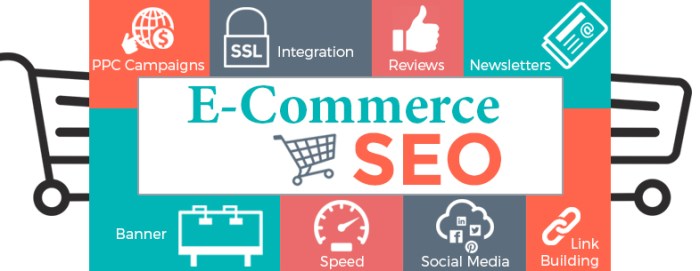
Step into the world of for e-commerce websites where online success awaits at every click. Unravel the secrets to enhancing your site’s visibility and driving organic traffic in this digital age.
Get ready to explore the art of tailored specifically for e-commerce platforms, and discover how to stay ahead in the competitive online market.
Introduction to for E-commerce Websites

, or Search Engine Optimization, is crucial for e-commerce websites as it helps improve online visibility and drive organic traffic to the site. By implementing effective strategies, e-commerce businesses can attract more potential customers and increase their sales.
Key Components of Strategies for E-commerce Websites
When it comes to optimizing e-commerce websites for search engines, there are several key components that need to be considered:
- Research: Conducting thorough research to identify relevant and high-converting s that potential customers are searching for.
- On-Page Optimization: Optimizing product pages, category pages, and other content on the website with targeted s, meta tags, and high-quality content.
- Technical : Ensuring that the website is technically sound, with fast loading times, mobile responsiveness, and proper site architecture for easy navigation.
- Link Building: Building high-quality backlinks from reputable websites to improve the website’s authority and rankings in search engine results.
- Content Marketing: Creating valuable and engaging content, such as blog posts, product descriptions, and videos, to attract and retain customers.
- User Experience: Providing a seamless and user-friendly experience for visitors, including easy navigation, clear calls-to-action, and fast checkout processes.
On-Page Strategies
When it comes to optimizing e-commerce websites for search engines, on-page strategies play a crucial role in improving visibility and driving organic traffic. By focusing on various elements within the website itself, businesses can enhance their chances of ranking higher in search engine results pages (SERPs). Let’s delve into some key on-page techniques specific to e-commerce websites.
Optimizing Product Descriptions, Titles, and Images
Product descriptions, titles, and images are essential components of any e-commerce website. Optimizing these elements for can significantly impact search visibility and user engagement. Here are some strategies to consider:
- Utilize relevant s: Incorporate target s naturally within product descriptions and titles to improve search engine visibility.
- Write unique and compelling descriptions: Craft descriptive and engaging product descriptions that entice users and provide valuable information.
- Optimize image alt text: Include descriptive alt text for product images to improve accessibility and enhance by providing context to search engines.
Significance of Internal Linking and URL Structure
Internal linking and URL structure are crucial aspects of on-page for e-commerce websites. They contribute to better navigation, user experience, and overall site optimization. Here’s why they matter:
- Enhanced user experience: Internal linking helps users discover relevant products and content within the website, improving navigation and engagement.
- Improved crawlability: Proper URL structure and internal linking make it easier for search engine crawlers to index and understand the website’s content.
- optimization: By strategically linking related product pages and using descriptive URLs, e-commerce sites can reinforce relevance and boost performance.
Off-Page Techniques

When it comes to optimizing e-commerce websites for search engines, Off-Page Techniques play a crucial role in improving visibility and driving organic traffic to your online store. These techniques focus on factors outside of your website that impact your search engine rankings.
Role of Backlinks in E-commerce
Backlinks are a vital component of off-page for e-commerce websites. They are links from other websites that point back to your site. Search engines like Google consider backlinks as a vote of confidence in your website’s authority and relevance. The more high-quality backlinks you have from reputable websites, the higher your site is likely to rank in search results.
- Backlinks act as a signal to search engines that your website is trustworthy and credible.
- They help search engines discover and index your site faster.
- Backlinks can drive referral traffic to your e-commerce site, increasing the chances of conversions.
Importance of Social Media Presence for Off-Page
Having a strong presence on social media platforms is essential for off-page of e-commerce websites. Social media signals, such as likes, shares, and comments, can indirectly impact your search engine rankings. Engaging with your audience on social media can help increase brand awareness, drive traffic to your site, and generate valuable backlinks.
- Social media platforms provide an opportunity to showcase your products, promotions, and engage with customers directly.
- Sharing content on social media can result in increased visibility and reach, leading to more inbound links to your e-commerce site.
- Building a loyal social media following can improve brand reputation and credibility, influencing search engine rankings.
Strategies for Building a Strong Backlink Profile for E-commerce Websites
Building a strong backlink profile is essential for the success of e-commerce . Here are some effective strategies to acquire quality backlinks for your online store:
- Guest Blogging: Write high-quality content for reputable websites in your niche and include a link back to your e-commerce site.
- Partner with Influencers: Collaborate with influencers in your industry to promote your products and link back to your website.
- Broken Link Building: Find broken links on authoritative websites and suggest your content as a replacement, earning a valuable backlink.
- Create Shareable Content: Develop engaging and shareable content like infographics, videos, and guides that naturally attract backlinks.
- Monitor and Disavow Bad Links: Regularly monitor your backlink profile and disavow spammy or low-quality links that may harm your efforts.
Tools for E-commerce Websites
In the world of e-commerce, having the right tools can make a significant difference in optimizing your website for search engines and driving organic traffic. These tools offer valuable insights, analysis, and strategies to help businesses improve their online visibility and ultimately increase sales.
Popular Tools for E-commerce
- Google Analytics: This free tool provides in-depth data on website traffic, user behavior, and conversions, helping e-commerce businesses track the effectiveness of their efforts.
- Ahrefs: Known for its comprehensive backlink analysis and research features, Ahrefs is a powerful tool for e-commerce websites looking to improve their search engine rankings.
- Semrush: Semrush offers a range of tools, including site auditing, tracking, and competitor analysis, making it a valuable asset for e-commerce businesses wanting to stay ahead of the competition.
- Moz Pro: Moz Pro provides tools for research, site audits, and rank tracking, helping e-commerce websites identify and address issues to improve their search visibility.
Comparison of Tools
| Tool | Features | Usability | Benefits |
|---|---|---|---|
| Google Analytics | Website traffic analysis, user behavior tracking | Easy to use interface | Insights for optimizing strategies |
| Ahrefs | Backlink analysis, research | Advanced features may require learning curve | Improves search engine rankings |
| Semrush | Site auditing, tracking, competitor analysis | Intuitive dashboard | Helps stay ahead of competitors |
| Moz Pro | research, site audits, rank tracking | User-friendly tools | Identifies and addresses issues |
Leveraging Tools for E-commerce Success
By utilizing these tools effectively, e-commerce businesses can gain valuable insights into their website performance, identify areas for improvement, and implement strategies to enhance their search engine visibility. Regularly monitoring and analyzing data from these tools can help businesses stay competitive in the online marketplace and drive more traffic and conversions to their e-commerce websites.
Marketing E-commerce
In the world of e-commerce, marketing plays a crucial role in driving traffic, generating leads, and ultimately increasing sales. When it comes to marketing strategies, is a key component that works hand in hand with other channels to maximize the reach and impact of e-commerce businesses. complements social media marketing, email marketing, and paid advertising in e-commerce by enhancing visibility, improving search engine rankings, and driving organic traffic to the website.
By optimizing website content, meta tags, and s, sets a strong foundation for other marketing efforts to build upon.
Integrating with Other Marketing Strategies
- Utilize Social Media Platforms: Share -optimized content on social media channels to increase engagement, drive traffic, and improve brand visibility.
- Email Marketing Campaigns: Include relevant s and links in email campaigns to direct recipients to -optimized landing pages or product pages.
- Paid Advertising: Combine s with paid advertising strategies to target specific audiences and enhance overall marketing performance.
Ending Remarks
As we conclude our journey through the realm of for e-commerce websites, remember that the key to thriving in the digital landscape lies in mastering these optimization strategies. Take charge of your online presence and watch your e-commerce business soar to new heights.
Frequently Asked Questions
How important is for e-commerce websites?
is crucial for e-commerce sites as it improves online visibility, drives organic traffic, and helps businesses stay competitive in the digital market.
What are some key components of strategies for e-commerce websites?
Key components include optimizing product descriptions, titles, images, internal linking, URL structure, and building a strong backlink profile.
How does complement other marketing strategies in e-commerce?
works hand in hand with social media marketing, email marketing, and paid advertising to create a comprehensive and impactful marketing strategy for e-commerce businesses.





